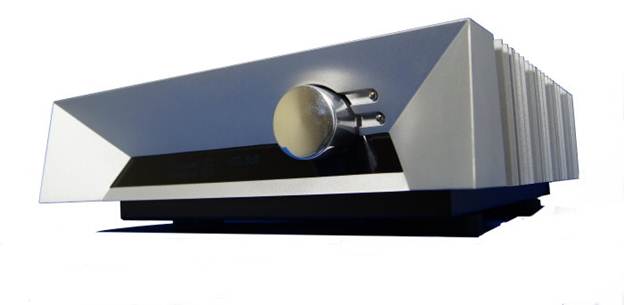This integrated amp’s style might
divide, but its sound is truly divine
Profile
Ratings: 5/5
Price: $5,700
What makes it special? A distinctive hybrid electronic design, with dual mono power
amplifier sections and valve pre-amplification working in Class-A mode
Tempted?
With those eye-catching looks and Pathos’s habit of turning out great-sounding
amplifiers, you bet we are

Pathos
Ethos
Italian brand Pathos doesn’t do ordinary.
Simply feast your eyes on the distinctive Ethos integrated amplifier and you’ll
see what we mean.
Astonishingly, this is one of Pathos’ more
conventional-looking products. Even so, we still think it would feel more at
home in Battlestar Galactica, discreetly tucked onto the flashy control panel
of a Cylon spaceship.
With Pathos, it’s never been just about
looks. In our experience, top-quality engineering, brilliant build and engaging
sound has always added substance to the company’s style-led designs.
As is the way of Pathos, the Ethos features
a hybrid electronic design. We’re not usually lovers of mixing valves with
solid-state. The intention is to combine the sweetness and fluidity of valves
with the grip of transistors – the reality, however, is usually a soggy mess.
But that’s not the case here.
Hybrid design hits a hot streak
The two valves visible on the top panel are
a pair of ECC 88s working in Class-A mode. Class A is a condition where a high
amount of current flows constantly through the circuitry, regardless of what
the music signal requires.
The upside is superior performance,
normally. The downside is high energy consumption and excess heat.
In this case, the relatively low power
requirements of preamplification means heat isn’t an issue from the valves –
however, that role is taken up by the dual-mono power amp sections. These run
hot enough to require the large expanse of heatsinking on both sides of the
Ethos. Those showy heatsinks get rather hot, so make sure there’s plenty of
ventilation before buying, as reliability will suffer otherwise.
That power section has some decent muscle
too. While an output of 100 watts into 8 ohms is no great shakes at this price,
the fact that it doubles as impedance halves is a sure sign that this amplifier
won’t wilt when taxed by difficult loads.

Memorizing
those remote buttons might be a problem, but the Ethos’s flexibility won’t be
We had some memorable listening sessions
with B&W’s mighty 800 Diamonds, and these are a pretty demanding load as
far as speakers are concerned. We got similarly positive results with our
resident ATC SCM50s, as well as Neat’s entertaining Ultimatum XL.
By the conventional stripped-down standards
of high-end stereo amplifiers, the Ethos is well equipped, too. It’s got plenty
of line level inputs (balanced and unbalanced), a remote control, and our
version came with a built-in digital-to-analogue conversion module (buy the amp
without a DAC and it’ll cost $4875).
You’ll need to load special driver software
onto your computer, whether PC or MAC, to make the digital link work. We got
this on a USB stick, but it’s also available as a download on Pathos’s website,
www.pathosacoustics.com.
Once the USB software drive is installed,
your computer will recognize the Ethos as a means of playback. The amplifier
has coaxial and USB inputs, and will happily accept 24-bit/ 192kHz resolution
files through both.
Sweet spot for Pathos
As far as functionality goes, things could
be a touch smoother. While that large volume control feels nice and positive,
we’re not particularly fans of the other front-panel switches. They feel vague
in action, as do the remote control buttons.
Pathos hasn’t labeled its quirky handset’s
buttons for style reasons. Sure, it looks classy – but it’s a pain to use until
the purpose of each button is well and truly memorized.
Any doubts raised by the amplifier’s
ergonomic oddities, however, evaporate like a politician’s promise once
listening starts. This is one sweet amplifier.

Offbeat
style, yes, but it’s a bang-on performance thanks to the Ethos’ unusual hybrid
design
The Ethos’s presentation is supremely
refined and full-bodied. It rounds off harsh edges in recordings and delivers a
rich, nicely textured bass. The same could be said of the many hybrid designs
that have entered our listening rooms but where the Pathos differs from those
designs is in the way it preserves the energy in a performance.
Despite the integrated amp’s lovely
manners, it’s still capable of delivering hard-charging music, such as the
apocalyptic anthem I Wanna Be Your Dog from The Stooges’ first album,
with a sizeable dose of potent punk-rock venom.
There’s plenty of musical momentum and no
loss of organization, even when – as with many of the punk rockers’ tunes –
things seem to get out of hand, sonically speaking. That combination of
aggression, refinement and vice-like control is as rare to find as it is
extremely welcome.
Move on to the likes of Beethoven’s
grandiose Symphony No.5 and the Pathos simply revels in the huge dynamic
sweeps and complex instrumentation. There’s plenty of insight without the
overtly analytical nature of most high-end integrated amps getting in the way.
You can add fine, stable stereo imaging and a sure-footed delivery of rhythms
to the growing list of plus points, too.
Put it all together and you have an
uncommonly talented integrated amp that’s as capable of putting a wide smile on
a hardcore audio enthusiast’s face as it is grabbing the attention of a
flamboyant interior designer. That’s certainly not something most high-end
competitors can boast about.